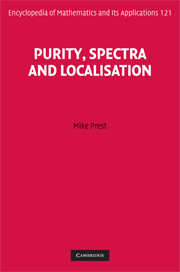Preface
Published online by Cambridge University Press: 05 March 2013
Summary
In his paper [726], on the model theory of modules, Ziegler associated a topological space to the category of modules over any ring. The points of this space are certain indecomposable modules and the definition of the topology was in terms of concepts from model theory. This space, now called the Ziegler spectrum, has played a central role in the model theory of modules. More than one might have expected, this space and the ideas surrounding it have turned out to be interesting and useful for purely algebraic reasons. This book is mostly about these algebraic aspects.
The central aim is a better understanding of the category of modules over a ring. Over most rings this category is far too complicated to describe completely so one must be content with aiming to classify the most significant types of modules and to understand more global aspects in just a broad sense, for example by finding some geometric or topological structure that organises some aspect of the category and which reflects the complexity of the category.
By “significant types of modules” one might mean the irreducible representations or the “finite” (finite-dimensional/finitely generated) ones. Here I mean the pure-injective modules. Over many rings this class of modules includes, directly or by proxy, the “finite” ones.
- Type
- Chapter
- Information
- Purity, Spectra and Localisation , pp. xv - xviPublisher: Cambridge University PressPrint publication year: 2009



